|
|
|
Sort Order |
|
|
|
Items / Page
|
|
|
|
|
|
|
| Srl | Item |
| 1 |
ID:
094395
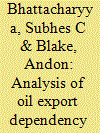

|
|
|
|
|
| Publication |
2010.
|
| Summary/Abstract |
The purpose of this paper is to analyse how oil export dependencies of Middle East and North African (MENA) oil producers have evolved over the past two decades and to identify the main driving factors from an energy policy perspective. The paper expresses the oil export dependency of each economy in terms of a multiplicative identity that captures effective export price, export to primary oil supply ratio, oil dependency and oil export intensity of the country. Using the data for 1980-2006, the evolution in these factors is investigated for seven MENA countries and the influence of the above factors is decomposed using the Laspeyres index. The analysis shows that energy price and increasing energy intensity in the MENA countries have influenced the overall oil export dependency. Reducing the energy intensity can improve oil export revenue share to GDP by 5-10% in most of the countries while Iran can gain significantly by increasing its export volume.
|
|
|
|
|
|
|
|
|
|
|
|
|
|
|
|
| 2 |
ID:
137736
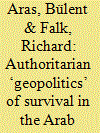

|
|
|
|
|
| Summary/Abstract |
The Arab Spring has shaken not only the state and society dimension in the countries of the MENA region but also the power of authoritarian leaders that had been ensured for a long period of time. This paper takes a critical look at the issue of how authoritarian regimes reacted to the new political atmosphere produced by the Arab Spring. More specifically it attempts to identify how geopolitical reasoning influenced the formulation of new strategies designed to promote the survival of authoritarian regimes. It focuses upon the geopolitical reasoning relied upon by Iran and Saudi Arabia, which included creating threat-enemy chains in domestic politics, shifting alliances in regional policy and taking advantage of relations with external actors to gain support for authoritarian rule at home
|
|
|
|
|
|
|
|
|
|
|
|
|
|
|
|
| 3 |
ID:
173917
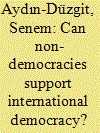

|
|
|
|
|
| Summary/Abstract |
In recent years, there has been a rise of interest in the concept of autocracy promotion, with scholars questioning whether the efforts by authoritarian governments to influence political transitions beyond their borders are necessarily pro-authoritarian. An extension of this question is whether some authoritarian governments may at times find it in their interest to support democracy abroad. This article aims to answer this question by focusing on the case of Turkey. It argues that, despite its rapidly deteriorating democracy since the late 2000s, Turkey has undertaken democracy support policies with the explicit goal of democratic transition in the Middle East and North Africa (MENA) region during the Arab Spring and, while not bearing the intention of democratic transition, has employed democracy support instruments in the form of state-building in sub-Saharan Africa since 2005 to the present day. Based on original fieldwork, the article finds that non-democracies can turn out as democracy supporters, if and when opportunities for strategic gains from democratisation abroad arise. The article further suggests that even in those cases where strategic interests do not necessitate regime change, a non-democracy may still deploy democracy support instruments to pursue its narrow interests, without adhering to an agenda for democratic transition.
|
|
|
|
|
|
|
|
|
|
|
|
|
|
|
|
| 4 |
ID:
163759
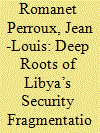

|
|
|
|
|
| Summary/Abstract |
Six years after the 2011 revolution that toppled the Gaddafi regime, the political transition in Libya is at a standstill. The fragmented security landscape fuels chronic local conflicts, lawlessness, and insecurity, and paralyzes the political transition with destabilizing consequences on its neighbors. What explains the rapid, profound, and lasting security fragmentation that affected post-Gaddafi Libya? Notwithstanding the manifest failures of the international intervention during and after the 2011 conflict, this article argues that the security fragmentation in post-Gaddafi Libya is deeply rooted in domestic economic, cultural, and political factors. In particular, the Libyan economy offers almost no employment opportunities, and the country lacks a unitary government and functioning state institutions that it needs to redistribute its oil wealth. Under these circumstances, Libyans attempt to cope with economic hardship, insecurity, and lawlessness by turning towards their family, tribe, neighborhood, or ethnic group, thereby fueling the fragmentation of security. Libya’s current security fragmentation and instability can be seen as part of the messy historical process of state formation. During this phase, political and security agreements are brokered and institutionalized through localized processes of rebel governance whose realm of possible arrangements are determined by contextual economic, political and cultural constraints.
|
|
|
|
|
|
|
|
|
|
|
|
|
|
|
|
| 5 |
ID:
159598
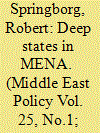

|
|
|
| 6 |
ID:
130305
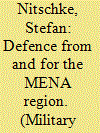

|
|
|
|
|
| Publication |
2013.
|
| Summary/Abstract |
The article focuses on the development of various airborne sensors for military missions in Middle East and North Africa (MENA) regions. It says that synthetic aperture radar (SAR), active electronically scanned array (AESA), and forward looking infrared (FLIR) are associated with bringing information to the military. It mentions that the most common way in acquiring high-resolution imagery from a battlefield is airborne reconnaissance.
|
|
|
|
|
|
|
|
|
|
|
|
|
|
|
|
| 7 |
ID:
171484
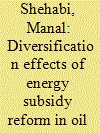

|
|
|
|
|
| Summary/Abstract |
For oil exporters, energy subsidy reform and economic diversification are critical policy responses to recent fundamental changes in the global oil market and oil price declines, yet the relationship between them is little understood. This article investigates linkages between energy subsidy reform and accelerating economic diversification away from hydrocarbons in a low oil price environment, using illustrations from Kuwait. It employs an economy-wide, general equilibrium model with oligopolistic industrial structure, the first of its kind for an economy in the Middle East and North Africa, that embodies unique elements of the country's economic structure—oil dependence; public sector dominance; subsidies; sovereign wealth funds; industrial collusive pricing behaviour; and guest workers. The article argues that, contrary to common popular discourse, Kuwait's economy has a diversified economic base, but this base fails to diversify export or government revenue needed for economic sustainability. Results show that weak economic diversification in oil exporters with a similar economic structure is not primarily due to “Dutch disease,” as dominant in the literature, but to economic constraints and distortions that impair structural change and exacerbate overdependence on hydrocarbons. Labour and competition reforms relax some constraints, achieving large efficiency gains that extend economy-wide and can expand non-energy tradable sectors. The analysis has important policy implications. First, the potential role of pricing regulation in small economies in moderating economic impacts of negative oil shocks. Second, in oil economies characterized by pervasive oligopolies, microeconomic reform can be a channel to achieve efficiency and better diversification effects of subsidy reform.
|
|
|
|
|
|
|
|
|
|
|
|
|
|
|
|
| 8 |
ID:
127514
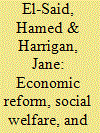

|
|
|
|
|
| Publication |
2014.
|
| Summary/Abstract |
This article fills an important gap in the literature by exploring the trends in social welfare in four MENA countries that have undertaken extensive economic liberalization programs under the auspices of the IMF and the World Bank - namely, Jordan, Egypt, Tunisia, and Morocco. Studying the experiences of these countries provides an opportunity to enhance the understanding of the link between economic reforms, the level of social welfare provision, and political stability.
|
|
|
|
|
|
|
|
|
|
|
|
|
|
|
|
| 9 |
ID:
183687
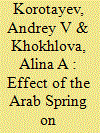

|
|
|
|
|
| Summary/Abstract |
In the Middle East and North Africa (MENA) region after the Arab Spring, monarchy has turned out to be a far stronger negative predictor of destabilization than it was before 2011. For the MENA, the period after 2010 can be subdivided into three periods: a mass protests period (2011–2012), the period of explosive growth of radical Islamist activities (2013–2016), and the second mass protest period (since 2016). Our analysis demonstrates that monarchies’ stabilization capacity was preserved in 2011–2012 and grew substantially during 2013–2016, as MENA monarchies turned out to be more resilient in the face of the outbreak of radical Islamism in the region.
|
|
|
|
|
|
|
|
|
|
|
|
|
|
|
|
| 10 |
ID:
151922
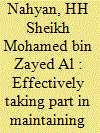

|
|
|
| 11 |
ID:
177602


|
|
|
|
|
| Summary/Abstract |
The English School famously established the existence of an International Society. The first generation of ES scholars (Bull 1995) demonstrated, as against rationalist approaches such as realism, that IS matters for world politics and identified its dominant institutions, with sovereignty often seen as the master institution. Institutional change was chiefly addressed first in ES work on the export of Westphalian sovereignty to the non-Western world (Bull and Watson 1984) and later in debates over the impact of the global diffusion of Western ‘World Society’s’ liberal norms (eg, human rights) on sovereignty-centric IS. Notably, Buzan (2004) and his collaborators argued that, while a ‘thin’ sovereignty-centric IS had been globalized, regions retained distinctive packages of institutions resistant to normative homogenization
|
|
|
|
|
|
|
|
|
|
|
|
|
|
|
|
| 12 |
ID:
192585
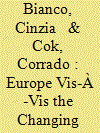

|
|
|
|
|
| Summary/Abstract |
Europe’s relations with the states of the Middle East and North Africa (MENA) are facing a critical juncture. When looking at a regional security architecture, Europe’s overarching interest is stability as it prevents conflict and state vacuums from menacing trade and energy supply routes, creating safe havens for terrorist organizations or hostile powers and fueling refugee flows toward Europe. However, compared to the past, European actors are confronted with a sharply new scenario in MENA that challenges these interests, given a progressive retrenchment of the United States, the rise of China, and MENA actors playing a more assertive role in regional politics and conflicts. The February 2022 Russian invasion of Ukraine is further accelerating these trends. Against this shifting background, MENA countries have intensified efforts to diversify their partnerships with rising global and regional players. European actors still struggle to come to grip with the multipolar scenario in the making—and to design an appropriate strategy to respond.
|
|
|
|
|
|
|
|
|
|
|
|
|
|
|
|
| 13 |
ID:
132389


|
|
|
|
|
| Publication |
2014.
|
| Summary/Abstract |
The European Commission has spelled out its policy ambition for EU energy cooperation with the southern neighbourhood with plans for the establishment of an 'Energy Community'. Its communications make clear that an Energy Community should be based on regulatory convergence with the EU acquis communautaire, much in the same vein as the existing institution carrying the same name; the Energy Community with Southeast Europe. It is puzzling that the Commission insists on repackaging this enlargement concept in a region with very different types of relationships vis-à-vis the EU, especially when considering the lukewarm position of key stakeholders in the field. According to them, any attempt to introduce a political integration model in this highly sensitive issue area in the politically fragmented MENA region might run the risk of hurting the incremental technical integration process that has slowly emerged over the past few years.
|
|
|
|
|
|
|
|
|
|
|
|
|
|
|
|
| 14 |
ID:
169905
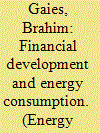

|
|
|
|
|
| Summary/Abstract |
This paper examines the relationship between financial development and energy consumption estimations in the major MENA countries (Algeria, Bahrain, Egypt, Iran, Iraq, Israel, Jordan, Kuwait, Lebanon, Libya, Morocco, Oman, Qatar, Saudi Arabia, Syria, Tunisia, United Arab Emirates and Yemen) over the period 1996 to 2014. We consider the energy use in kg of oil equivalent per capita as a dependent variable that reflects the cross-country energy consumption. We measure the level of financial development in the MENA countries by considering banking indicators. Extending the model of Sadorsky (2011), we estimate both linear and non-linear dynamic panel model. We use new robust econometrics to take into account heterogeneity and nonlinearity and we control the estimation results for the period of the global financial crisis. The results of the study report a positive and statistically significant relationship between the intermediation capacity of the banking system as well as its size and energy consumption. The findings also confirm a non-linear and inverted U-shaped relationship between financial development and energy demand for the MENA region. This implies that initially energy demand increases with financial development and then, at a turning point of financial development, it declines. The policy implications of these results are discussed.
|
|
|
|
|
|
|
|
|
|
|
|
|
|
|
|
| 15 |
ID:
149442
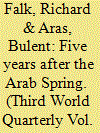

|
|
|
|
|
| Summary/Abstract |
A new political geography has emerged in the Middle East and North Africa (MENA) after the Arab Spring. The transformative impact of the popular upheavals appeared to put an end to long-term authoritarian regimes. Today, the region is far from stable since authoritarian resilience violently pushed back popular demands for good governance and is pushing to restore former state structures. However, the collective consciousness of the popular revolts endures, and a transformative prospect may emerge on the horizon. The chaotic situation is the result of an ongoing struggle between those who seek change and transformation and others in favour of the status quo ante. A critical evaluation of the Arab Spring after five years indicates a continuous process of recalculation and recalibration of policies and strategies. There are alternative routes for an eventual settlement in the MENA region, which are in competition against both regional and transregional quests for a favourable order.
|
|
|
|
|
|
|
|
|
|
|
|
|
|
|
|
| 16 |
ID:
160487
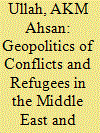

|
|
|
|
|
| Summary/Abstract |
Geopolitically intertwined and strategically significant refugee policy in the MENA region is frequently analyzed in light of well-documented ethnic, religious, class, and border conflicts. However, the policy is also inexorably linked to the broader geopolitics of the global refugee protection regime and discourse. This article analyzes the complex relationship between geopolitics, domestic political dynamics, and their attendant crises in the MENA region. The complex set of political shockwaves of the Arab Spring induced massive mobility of people which may compound incipient political tensions between and within MENA states.
|
|
|
|
|
|
|
|
|
|
|
|
|
|
|
|
| 17 |
ID:
148065
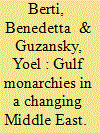

|
|
|
|
|
| Summary/Abstract |
More than three after the beginning of the Arab Awakening, it appears that the upheavals have, by and large, left the Gulf monarchies intact. While several dictators have fallen— from Ben Ali in Tunisia, Mubarak in Egypt and Gaddafi in Libya to Saleh in Yemen— monarchies across the region have shown considerable survival skills. But is this purported resilience likely to last even as the Arab Awakening continues to shake the Middle East and North African (MENA) region, or are the monarchs next in line now that the “presidents for life” have met their demise? This article explores the various ways in which Gulf monarchies have experienced political and social mobilizations associated with the Arab Awakening and then analyzes the characteristics that have allowed these countries to weather the storm, focusing on both pre-existing structural and cultural factors, as well as political responses to the unfolding regional protests.
|
|
|
|
|
|
|
|
|
|
|
|
|
|
|
|
| 18 |
ID:
186871
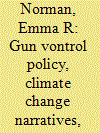

|
|
|
|
|
| Summary/Abstract |
At the time of writing this Editor's Note, it has been but a few weeks since the horrifying school shooting in Uvalde, Texas on May 24, 2022, that killed 19 children and two teachers, and the supermarket massacre of ten people in Buffalo, New York ten days earlier. Both lone gunmen were 18 years old and both used legally acquired AR-15-style weapons (Edmondson 2022). The events catapulted gun control debates again into the headlines and culminated in swift legislation proposals in Congress. On June 8, 2022, a bitterly divided House—voting largely along party lines—approved a stricter gun control bill package by 223 to 204 votes but also revealed the partisan chasm that continues to afflict passing effective firearms control legislation in the United States. Among other things, the bill would ban under-21s from legally purchasing semiautomatic rifles, increase requirements for gun storage in private households, and prohibit the sale of magazines holding over 15 rounds (Edmondson 2022). The acrimonious arguments in the House were predictably partisan with Democrats focusing on protecting children from gun violence while Republicans highlighted that the proposal would violate Second Amendment rights. Representative Jim Jordan (R-OH; cited in Edmondson 2022), opined that protecting children “is important—it sure is. But this bill doesn't do it. What this bill does is take away Second Amendment rights, God-given rights, protected by our Constitution, from law-abiding American citizens.”
|
|
|
|
|
|
|
|
|
|
|
|
|
|
|
|
| 19 |
ID:
163239
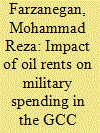

|
|
|
|
|
| Summary/Abstract |
This study shows how the level of corruption matters in the way oil rents affect a state's military spending. Using panel data covering the 1984–2014 period for the Gulf Cooperation Countries (GCC), we find that the effect of oil rents on military budgets depends on the extent of political corruption. Oil rents are negatively associated with military spending of the GCC countries. However this, in turn, is moderated by higher levels of corruption. For comparison, we examine this association in non-GCC countries in the MENA region, finding a positive effect of higher oil rents on military spending: this effect is larger in corrupt polities within non-GCC countries. The intermediary role of corruption in the military-oil nexus is robust, controlling for a set of variables that may affect military spending.
|
|
|
|
|
|
|
|
|
|
|
|
|
|
|
|
| 20 |
ID:
133224
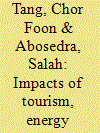

|
|
|
|
|
| Publication |
2014.
|
| Summary/Abstract |
Using panel data of 24 countries in the Middle East and North African (MENA) region from 2001 to 2009, the purpose of this study is to examine the impacts of tourism, energy consumption and political instability on economic growth within the neoclassical growth framework. To address the objective of this study, we utilise both the static panel data approach as well as the dynamic generalised method of moments (GMM) estimator to examine the impact of candidate variables. Our results show that energy consumption and tourism significantly contribute to the economic growth of countries in the MENA region. Hence, our study lends some support to the existence of the tourism-led growth and energy-led growth hypotheses in the region. In line with our expectation, our estimation results also reveal that political instability impedes the process of economic growth and development in the MENA region. Therefore, macroeconomic policies to promote expansion in tourism and energy consumption will directly stimulate economic growth. Additionally, efforts to help the region overcome its history of political instability would attract more international tourist arrivals and further invigorate economic growth.
|
|
|
|
|
|
|
|
|
|
|
|
|
|
|
|
|
|
|
|
|